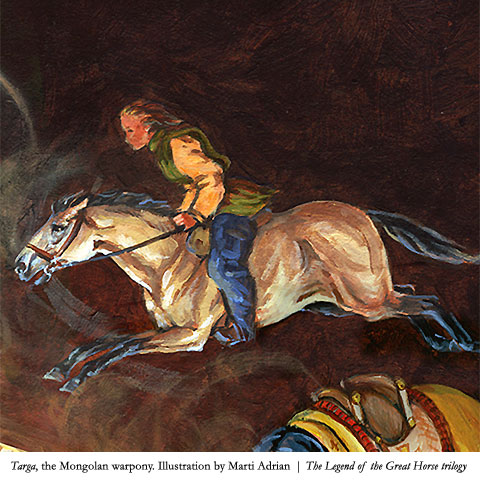Eclipsed by Shadow, is the first volume of the new trilogy adventure, “The Legend of the Great Horse,” which begins a journey that traces the history of horsemanship. In the story, the heroine, Meagan Roberts, is taken back through time by her horse, Promise. Meagan must survive humanity’s brutal past armed only with her knowledge of advanced horsemanship of the 21st century.
One of the interesting things about our relationship with horses is how slowly it developed. For many millennia mankind struggled with “conquering” the horse, when in reality simple humane treatment and empathy was the path to tapping into the equine potential. Today’s sensibly schooled horses could literally canter circles around primitive man’s poorly “broken” and brutalized mounts.
In the story, Meagan is dropped off in various time periods and must fend for herself. One such era is during Europe’s Dark or Middle Ages, when the enlightened horsemanship of Greek antiquity has been forgotten and brutality was again the norm of the day.

- “Mongolian Steppe” by David Edwards | National Geographic
It was in this era that Mongolian nomads burst from their ancestral homes on the Asian plains to pillage and ransack from Russia to Poland, throughout India and the Middle East. Meagan lands amidst the united armies of Genghis Khan and is given a Mongolian warhorse mare she names Targa.
The mare is typical of her breed: stocky, short-legged and pony-sized. Meagan succeeds through empathizing with the mare and employing modern riding techniques that provide strong yet humane guidance. Their association grows into a real horse-rider partnership.
Targa illustrates how unchanged the horse’s nature is after many millennia of human “domestication.” Horses are simply too old a species to have become more than superficially adapted to mankind’s demands. Targa responds to Meagan’s enlightened empathy as horses do today; horses of primitive man would have done the same if given the opportunity.
The rampaging Mongolians cherished their horses, and their horses responded. This responsive cooperation with their riders led to wiping out alien societies, but there was no malice in the Mongolian warponies. Despite talk of the military “genius” of Genghis Khan, had Western society remembered their enlightened horsemanship instead of traveling down the path of war and brutality, they likely would not have been overrun by the superior skill of their Asian raiders.
There are many lessons in history, but one of the foremost is how spectacular are the results of empathy and harmony.

